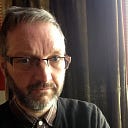Quiet Revolutions
The consolation of slow news when fast news may only add to a sense of desolation. A Thought For The Day on BBC Radio 4’s Today.
A few weeks ago I clipped on a safety helmet, climbed a series of ladders and eventually emerged on the roof of our parish church.
In front of me lay a gleaming array of solar panels, gorging on the sunlight.
Deploying the traditional Anglican fundraising strategy — grants, gifts and cake sales — the church plans to just stop gas.
A heat pump and solar panels have shrunk the carbon footprint of the old building and some days it generates energy equal to the daily use of 25 people.
It’s a miniature moment in a quiet revolution.
A report published this week found that in the first six months of this year solar and wind overtook fossil fuels in generating electricity in the European Union.
While one analyst called this an ‘historic shift’, the story was not widely covered.
It’s been a week of what seemed like a troubling new headline every day. This morning no different.
When I was a newspaper journalist August was known as the ‘slow news’ month, but today news is fast, rolling and 24/7.
And sometimes there’s too much of it to take in.
A C16th Christian mystic, Ignatius of Loyola, came up with a good way of processing a difficult day.
He suggested people explore their feelings of both desolation… and then of consolation.
That’s what the poet Wendell Berry does in his poem The Peace of Wild Things.
Berry says that when he feels desolate at world events — when he ‘wakes in the night at the least sound’ — he heads toward nature for consolation, to find a heron on a lake under the stars.
For a time, he writes, ‘I rest in the grace of the world and am free.’
But there can also be consolation in the news itself, in an alternative news cycle which is so incremental and subtle that we may not observe it taking place.
I think of my mother who was one of 12 children and lost one brother to polio. Less than forty years ago this killer disease infected 350,000 people every year. Last year there were barely 500 cases.
I look for consolation in the hidden cycle of slow news, which has a greater circumference than the cycle of fast news.
I look to the words of Martin Luther King, who had many reasons to feel desolate but still believed, as he put it, that ‘The arc of the moral universe is long and it bends towards justice.’
I look for consolation in the quiet, unreported lives of people diligently working on a better world. Even in the hidden solar panels on a church roof.
‘For a time I rest in the grace of the world and am free.’
